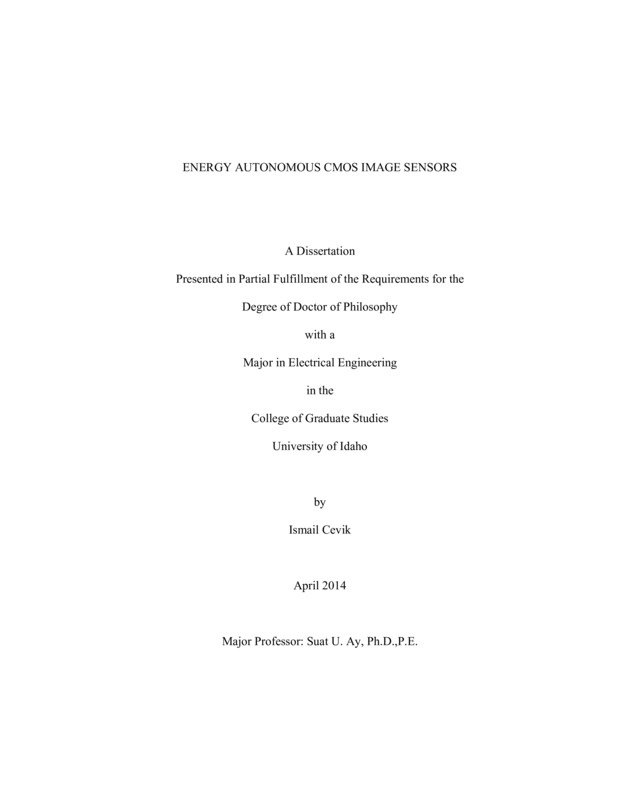Energy Autonomous CMOS Image Sensors
Cevik, Ismail. (2014). Energy Autonomous CMOS Image Sensors. Theses and Dissertations Collection, University of Idaho Library Digital Collections. https://www.lib.uidaho.edu/digital/etd/items/cevik_idaho_0089e_10243.html
- Title:
- Energy Autonomous CMOS Image Sensors
- Author:
- Cevik, Ismail
- Date:
- 2014
- Keywords:
- Energy Harvesting Image Sensors Low Noise Low Power
- Program:
- Electrical and Computer Engineering
- Subject Category:
- Electrical engineering
- Abstract:
-
Harvesting energy from ambient sources is vital for extending the operational lifetime of electronic systems deployed in inaccessible environments where battery replacement is difficult, if not impossible. Ambient sources can power an electronic system as long as the ambient energy source persists and is harvested efficiently, potentially leading to an infinite operational lifetime.
Both image sensors and solar cells require sufficient illumination for proper operation. Ultra-low power complementary metal oxide silicon (CMOS) active pixel sensor (APS) imagers can be powered through harvesting the solar energy incident on the focal plane of the image sensor.
The focus of this study is developing techniques for designing ultra-low power CMOS APS imagers and maximizing the energy harvested on their focal planes with the ultimate goal of achieving continuous self-powered operation. Fundamental problems associated with designing ultra-low power CMOS APS imager systems and on-chip energy harvesting and power management systems are addressed in this research.
The technical inquiry is divided into four research objectives. The first objective is the investigation of fundamental operating principles of photovoltaic energy harvesters and the problems associated with their design. The second objective is to develop pixel structures, which can harvest energy and capture images continuously, as opposed to the current EHI pixels which can harvest energy and capture images sequentially. The third objective is developing micro power management systems for utilizing the harvested energy as a usable power source and integrating these systems with the image sensor. The fourth objective is designing an ultra-low power CMOS APS imager which could be powered by the harvested energy.
The intellectual merits include: (1) providing a foundation for a new area of research on energy autonomous CMOS APS image sensors, (2) understanding the challenges in the design of ultra-low power image sensors, (3) understanding the challenges in the design of high efficiency solar energy harvesting structures, (4) developing high efficiency micro power management systems.
Two EHI type CMOS APS imagers that achieved all the set goals of the research are reported in this work. A new EHI pixel technology was developed for the first sensor (3rd generation EHI) for increasing the harvested energy fifteen times (15x) compared to the earlier EHI pixel technology. The pixel used in the 4th generation EHI sensor was designed for capturing images and harvesting energy simultaneously. Power generation capacity of the 4th generation EHI sensor was reduced by 33% compared to the 3rd generation EHI sensor. The 4th generation EHI imager achieved the world's lowest power consumption (270nW) while producing low-noise images at 0.7 frames per second, with a 96x96 resolution paving the way for an autonomous CMOS APS imager sensor.
- Description:
- doctoral, Ph.D., Electrical and Computer Engineering -- University of Idaho - College of Graduate Studies, 2014
- Major Professor:
- Ay, Suat U.
- Committee:
- Elshabini, Aicha; Barlow, Fred; Abdel-Rahim, Ahmed
- Defense Date:
- 2014
- Identifier:
- Cevik_idaho_0089E_10243
- Type:
- Text
- Format Original:
- Format:
- application/pdf
- Rights:
- In Copyright - Educational Use Permitted. For more information, please contact University of Idaho Library Special Collections and Archives Department at libspec@uidaho.edu.
- Standardized Rights:
- http://rightsstatements.org/vocab/InC-EDU/1.0/

